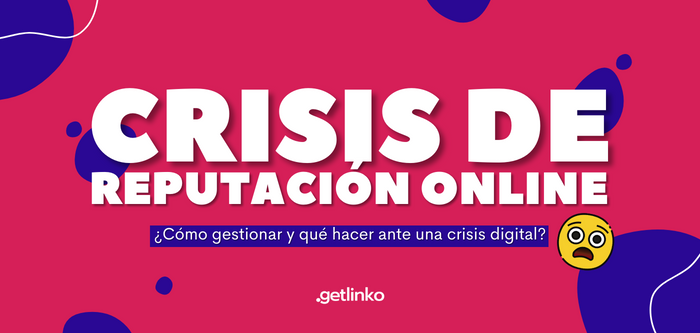It’s nothing worse than your customer not wanting to buy your product or service because they have a bad perception of your brand based on what they saw on the internet and social networks, or much worse when they remember a public scandal in which your brand was involved negatively resulting in you entering their blacklist. This is just one of the big consequences of what an online reputation crisis can cause.
Fortunately, with a series of strategies and actions, we can avoid and deal with an online reputation crisis.
What is an online reputation crisis?
An online reputation crisis is when a company or brand’s image and perception are negatively affected by users in the digital environment. It is characterized by the massive dissemination of negative information, unfavorable comments, and criticism of the company on online platforms such as social networks, forums, and blogs, among others.
A digital reputation crisis is a critical situation in which a company’s image is damaged online, which can have significant consequences on its reputation, public trust, and ultimately its business performance and results.
An online reputation crisis is not only limited to the spread of negative information but also involves how the company responds and manages the situation.
These crises can arise due to negative events, incidents, or decisions that go viral on the internet and generate a lot of public attention and negative comments on digital platforms. These situations can affect customer trust, brand perception, and stakeholder relationships.
Possible Causes of the Online Reputation Crisis
Online reputation crises can arise for various reasons and situations that generate a negative perception of a company or brand in the digital environment. Some possible causes include:
Quality Issues and Deception in Advertising
If a product or service has defects, malfunctions, or doesn’t meet customer expectations, it can lead to negative reviews and comments online.
In addition, if a company exaggerates its products or services in its advertising by adding functionalities, making promises, hiding possible risks, and the reality does not meet the expectations generated, customers may feel deceived and express their discontent online.
Ethical or moral controversies
Situations involving company decisions or actions that are perceived as immoral, unethical, or socially irresponsible can trigger a reputational crisis.
Additionally, offensive, insensitive, or inappropriate posts or comments on the brand’s digital assets by employees, executives, or the company in general can provoke a negative reaction from users.
Conflicts with skateboarders and competitors
Disagreements with key stakeholders, such as customers, suppliers, or employees, can lead to criticism and spread online, affecting the public perception of your company. Also, your competitors or other actors may spread false or negative information about your brand to undermine its reputation.
Social Media Incidents
Negative viral posts, misunderstandings, or boycott campaigns on social media can quickly damage a brand’s reputation. If a company fails to address a negative situation appropriately, transparently, and sensitively online, it can worsen the situation.
It is important to mention that they can result in legal problems, lawsuits, or regulatory problems that can damage the company’s image and generate concerns among consumers.
Mishandling a Small Crisis
As stated previously, companies need to address negative situations appropriately, transparently, and sensitively online.
Brands should be prepared to deal with these situations, have a crisis management strategy, and maintain transparent and effective online communication to minimize the impact of a potential reputational crisis.
Online Reputation Crisis and Negative Search Engine Ratings
In today’s digital world, online reputation crises can take on a new dimension when negative ratings about a company are indexed in search engines.
These notes, coming from various online sites such as news sites, blogs, and forums, can persist in search results and generate a lasting negative perception.
They can influence people’s impressions of a brand, especially when researching online. Each search can reinforce the negative image, making the challenge even greater. Addressing this situation requires a comprehensive strategy that combines positive content management and search engine optimization.
How to Combat Negative Search Engine Reviews
The key focus here is to create and promote positive content that offers a more well-rounded and positive view of the brand. This can include success stories, testimonials from satisfied customers, and core brand values. In addition, working on an effective SEO strategy to improve your online reputation is essential to position this positive content above the negative notes in search results.
Collaborating with SEO experts can be a valuable strategy, as they can implement techniques to improve the visibility of positive content and reduce the prominence of negative notes. Proactive online reputation management, along with search engine optimization, can help gradually reverse the negative impact of these crises and restore the company’s positive image online.
Getlinko is a marketplace where you can find more than 10,000 digital media that speak positively about your brand to contribute to your link-building strategy. This is based on the generation of sponsored articles and blogs in the main media worldwide. It also allows you to view data and metrics from trusted SEO sources and Google Analytics so you can choose the one that best suits your brand.
Online reputation and social media crisis
Social media plays a key role in online reputation crises. Thanks to its massive diffusion and speed of communication, any incident can go viral in a matter of minutes. This implies that a reputational crisis can spread quickly and reach a large number of people in a short time.
Social media allows users to share information instantaneously, which can be detrimental in a reputational crisis. A simple negative comment or bad experience shared on social media can affect a company’s image significantly.
In addition, social networks allow users to interact directly with the company and express their opinions publicly. This can generate a domino effect, where other users join the claim, and the crisis is further amplified.
Example of a major online reputation crisis
In this section, we will analyze some cases of companies that have suffered major online reputation crises and have not been able to manage them properly. These examples will allow us to understand the importance of good reputation management and draw lessons to avoid making the same mistakes.
Nestlé and the GreenPeace campaign
Nestlé’s famous case of negative digital reputation in 2010 was related to Greenpeace’s campaign against the company for its alleged contribution to deforestation and degradation of rainforests through the use of palm oil in its products. Greenpeace alleged that Nestlé was contributing to environmental damage and threatening biodiversity by using palm oil from suppliers who were involved in the destruction of natural habitats, including orangutan habitats.
How did Nestlé respond?
The crisis was triggered when Nestlé responded to Greenpeace’s criticism inappropriately on its Facebook page. Instead of addressing concerns empathetically, the page’s administrators responded in a defensive and somewhat confrontational manner, leading to an even more negative reaction from the online public.
Nestlé’s response and the way they handled the initial crisis on social media sparked an avalanche of negative comments, criticism, and calls for an online boycott. The case became an example of how poor management of online reputation and social media can worsen a crisis and further damage a company’s image.
Eventually, Nestlé withdrew the initial response from its social media and issued a public apology. The company also pledged to take more responsible steps in its supply chain to address concerns about palm oil. The Nestlé case serves as a lesson in the importance of effective and empathetic communication online during a reputational crisis.
4 Steps to Address an Online Reputation Crisis
Managing an online reputation crisis is crucial to minimizing the negative impact on the company’s image and restoring customer trust. Here are some key steps to managing a reputation crisis effectively:
1. Early Identification
Quickly detect and recognize any issues or negative situations that may have an impact on the company’s reputation. Monitor social media, review sites, and online conversations.
2. Assess the severity
It determines the magnitude and scope of the crisis. How big is the problem, and who is being affected? This will help you determine the level of response needed.
3. Internal communication
Inform your internal team about the situation to ensure a coordinated and consistent response. Everyone should be aware of the situation and how it will be addressed.
4. Respond quickly
Don’t wait to address the situation. Respond immediately and proactively on social media and other channels where the crisis is spreading.
Remember that every situation is unique, and how you handle the crisis can have a lasting impact on the perception of your company. Transparency, honesty, and prompt response are essential to protecting and restoring your brand’s reputation online. However, here are some tips on how to manage a crisis properly.
How to Respond to an Online Reputation Crisis
The most important thing is to remember to remain calm and professional in all interactions, even if the comments are negative or provocative. Avoid getting into arguments or confrontations, as this would only aggravate the problem, and follow these tips below:
Limit climbing
If the crisis is on social media, try to take conversations to private channels to address issues in more detail and avoid public escalation.
Be transparent and establish a unified voice
Provide accurate and honest information about the situation. Acknowledge any mistakes and apologize if necessary. Transparency builds trust. Maintain a consistent tone in your communications. Define who the spokesperson will be and make sure all messages are consistent.
Provide solutions
It offers concrete solutions and actions that are being taken to solve the problem. Customers want to see that you’re taking corrective action.
Monitor and respond in a personalized way
Approach affected people in a personalized way. Respond to their concerns and show empathy towards their concerns. Continue to monitor social media and other channels to make sure the crisis is being brought under control. Constantly monitor to ensure that the solutions implemented are working.
Learn & Improve
After you’ve handled the crisis, evaluate what happened and determine how you can prevent similar situations in the future. Learn from experience and adjust your policies and processes.
Join Getlinko and improve your online reputation
Following the advice that Getlinko offers you, as well as starting a link-building strategy through the means available in its catalog, will give your brand a better positioning in search engines and increase its visibility and authority while generating a healthy online reputation.
If you want to keep up to date with the best techniques and tips, you should register with Getlinko on all its networks, both LinkedIn, X, and Instagram, and also keep an eye on the blog posts, where every week a variety of content related to SEO, digital marketing and the news surrounding both is offered.
In addition, the platform stands out for being a marketplace with more than 10,000 media so that you can start your positioning strategy through link building and obtaining quality backlinks.







